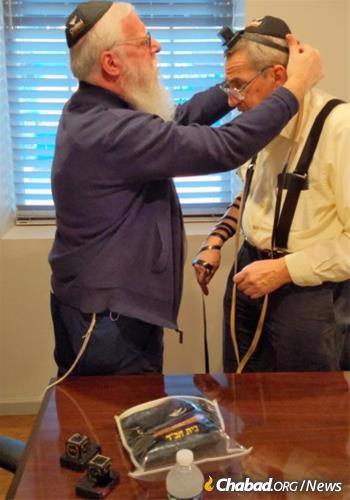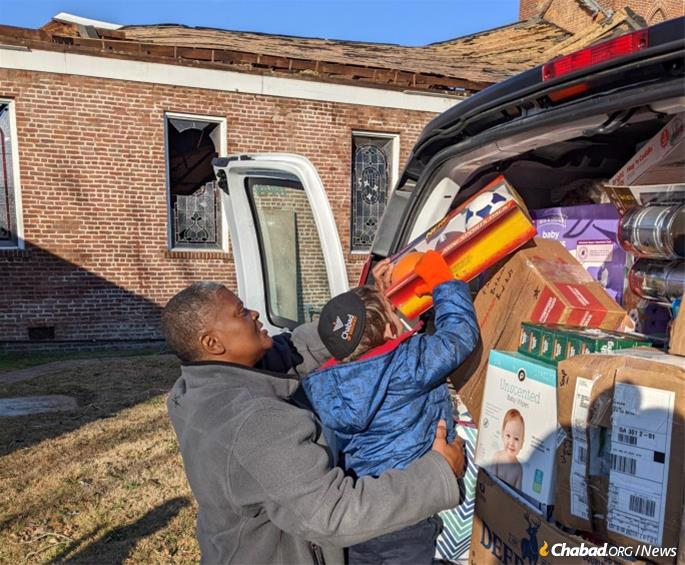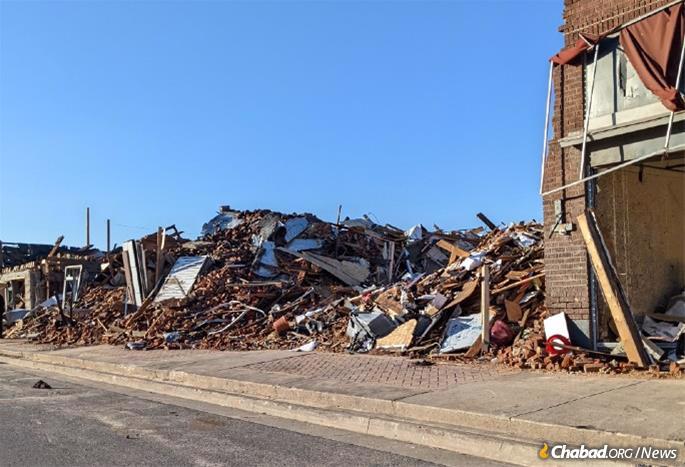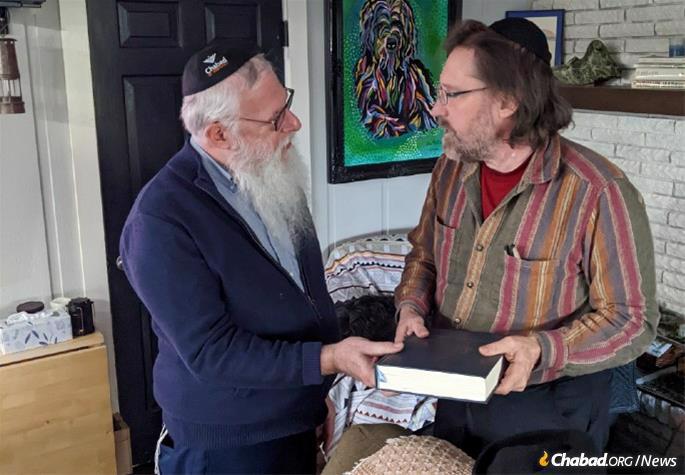
Kentucky Rabbis and Volunteers Expand Support for Tornado Victims
by Aharon Loschak – chabad.org
“We are numb. We are scared. We are overwhelmed.”
That’s what Ron, a farmer just south of Louisville, Kentucky, told Rabbi Avrohom Litvin of Chabad-Lubavitch of Kentucky when the rabbi reached out to offer help in the aftermath of the tornado that tore through the county on December 10. For Ron, and many others in the surrounding counties hit especially hard, Chabad’s efforts have been a lifesaver.
As they make their rounds throughout the Western Kentucky countryside, the importance of their relief efforts is becoming increasingly obvious to Litvin and his crew. And as they move about, touching individuals in the remotest parts of the Bluegrass state, flashes of positive inspiration can be seen at every turn.
December 10 will remain a tragic day in Kentucky history, as multiple tornados rushed across the western part of the state and left at least 76 dead and billions of dollars in damage that experts say will take decades to repair.
In the immediate aftermath, Chabad of Kentucky sprung into action. Already active in aiding the state’s most underserved, Chabad of Kentucky was uniquely equipped to bring immediate aid to those who suddenly were thrust into abject need.
Since 2019, Project Friendship—Chabad of Kentucky’s social-services arm—has focused on providing clothing, shoes and other necessities to those in need.
Adapting and Expanding Efforts

As the days wane on and the extent of the damage becomes clearer, the aid efforts have adapted and expanded.
“Right after disaster struck, we were focused on people’s immediate, basic needs,” Litvin told Chabad.org. “The first day, those who still had homes turned on their sinks and realized they had no water. So, with assistance from the Israeli government, we supplied bottled water. The next day, we distributed clothing for the children, as so many were without homes. The day after that, the realization began to sink that it wasn’t only the children who would be needing clothing; many didn’t have anything more than the shirt on their back. So we gave out clothing, shoes, and blankets to everyone.”
Beyond the immediate bare necessities for those whose homes were torn to pieces, the damage runs quite broad and deep. To that end, the Rabbi and his team are doing their very best to provide whatever type of support they can, ranging from cleaning supplies to assisting in ridding floors of mold from flooding, to simply lending a listening ear to those who suffered physical loss as well as mental anguish.
“The national response to the catastrophe has been wonderful. The Red Cross, FEMA, and even the National Guard were all here doing what they could,” Litvin said. “But, of course, they’re not going to stick around forever. Long after they’ve moved on, the lingering effect will be here, and very prominently so. And so will we; we’re not going anywhere. The good people here in Kentucky really need that support, and it’s our job to be there for them in any way possible.”

Truckloads of Supplies Roll In and Out
And support is what they’re giving. As truckloads of supplies roll in daily from retailers such as Amazon, Walmart, and Bed Bath and Beyond, the volunteer effort has expanded to a veritable army of good.
Litvin has encountered a heartening amount of positive energy and bright Jewish souls.
Volunteers have poured in from as far as New York City. Just this past week, Jamie Lassner drove down with a group of students from the Hebrew Academy of Great Neck that he runs, spending two days in the area distributing shoes, clothing, and blankets. An eye-opening experience for the students, they spent an entire day servicing communities that, according to Litvin, would have not otherwise received such help, such as Amish villages that dot the countryside.

Unearthing the Positive
“When we were giving out water the very first day, many of the people responded, ‘Rabbi, thank you so much, but we’re OK. Don’t give it to me, give it to my neighbor,’” Litvin said. “These are good, salt of earth folks, and the amount of generosity and positive outlook we’re encountering is just so inspiring.”
Mark Solomon of Dawson Springs, Kentucky, was one such inspiration. A tiny hamlet, seventy-five percent of the town has been ravaged, and like so many others, Mark currently has no home. Yet when Litvin made his way there and met up with Solomon, the latter wasn’t bemoaning his situation at all.
“I see the goodness of man in this tragedy,” Solomon told the Rabbi, “everyone is just trying to help one another get through this.”
Living in such a small and distant village, Solomon hasn’t had the opportunity to put on tefillin for 57 years—since his bar mitzvah. Though their meeting was due to tragedy, Solomon was eager and moved when putting on the tefillin.

Mayfield, Kentucky, a small town of just over ten thousand inhabitants, was hit especially hard. One of the first towns in the tornado’s path, almost the entire city was destroyed, and in a particularly tragic event, a candle-making factory was walloped with over a hundred employees inside, resulting in eight deaths and numerous injuries.
Deep in the Kentucky backcountry, Mayfield doesn’t boast many Jewish residents. But for James Glassner, Mayfield is home, and as far as he knew, he was the only Jew in town. Far from any Jewish infrastructure, he has been studying Torah over the phone through the Jnet study partner program with Isser Charter, from Westlake, California.
And then, like Moses appearing in the desert, Rabbi Litvin showed up with provisions and cheer. The two enthusiastically met, and after being provided with his material needs, the latter put on tefillin as well. Sometime later, Litvin returned to gift Glasser a brand new copy of the Torah for him to study at home.
That Torah copy is somewhat of a full circle for Glassner and his study partner, Charter. “I met James serendipitously one day in the kosher winery in California back when he still lived here, and we instantly hit it off. It didn’t take long until we agreed to learn together regularly, and here we are, four years later, still going at it. We’ve had many great conversations over the years, and we managed to keep up with each other even after he relocated to Kentucky. He was really blown away when Rabbi Litvin appeared.”
The chance to bring the flame of hope, positivity, and G‑d to such places is truly edifying for both those who receive it and those who bring it. “When we left New York for Kentucky in March of 1985, we received a message from the Rebbe [Rabbi Menachem M. Schneerson, of righteous memory] that we were to tend to the physical and spiritual needs of every Jew in Kentucky,” said Litvin. “When I met Mark in Dawson Springs and then put on tefillin with him for the first time in 57 years, I remembered that moment and felt like I was fulfilling that mission.”
Contributions to the tornado-relief efforts can be made here
This article has been reprinted with permission from chabad.org












